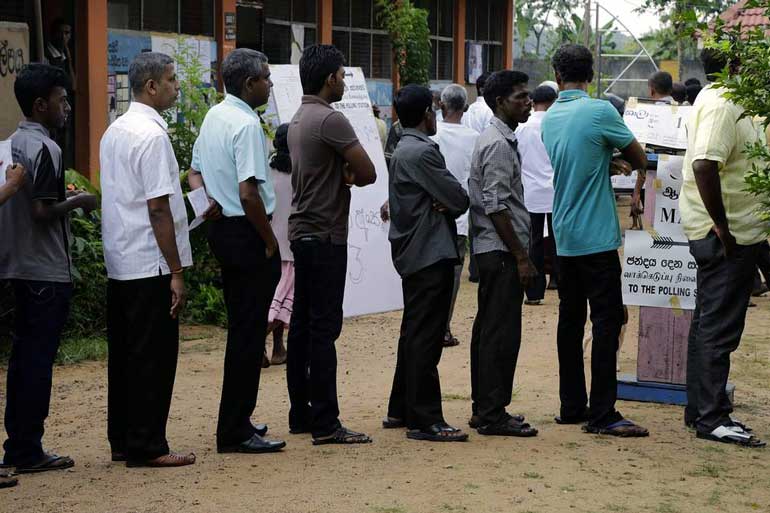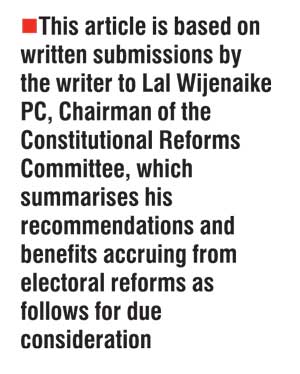Sunday Feb 15, 2026
Sunday Feb 15, 2026
Saturday, 30 January 2016 00:00 - - {{hitsCtrl.values.hits}}

The country must develop in harmony without ‘confrontational politics’ in a modern world
 By J.B.V Fernando
By J.B.V Fernando
1. Given a decentralised political administration system of governance, it is imperative to rationalise the number of MPs (225) through a proper work study based on well-defined objectives and role responsibilities taking also examples from countries in the region, finally constitutionalising a formula of one MP for ‘X’ number of registered voters. In our view even the present 225 is an unproductive assemblage.
2. MPs’ salaries and perks should be recommended by an independent committee comprising productivity and work study experts. If this happened before, the taxpayer would have saved the enormous financial burdens arising from the present guarantee of five-year pension and duty free vehicles for MPs. The MPs gathering to increase their own salaries and perks is tantamount to a ‘conflict of interest’.
3. Since the MPs in the National Parliament are at the top of the administration ‘pyramid’, and there is no need for them to collect preference votes, they should not be allocated ‘decentralised funds’. On the contrary, they should monitor the usage and recommend the allocation of decentralised funds to the lower layers at Provincial Council (PC) and Pradeshiya Sabha (PS) level by monitoring the existing District Development Committees.
4. The present decentralised political administration structure should be strengthened by reviewing and specifically laying down the role responsibilities and limits for the respective layers in the pyramid viz. the Parliament, PCs and PSs. In our view, there is a need to reduce the powers of MPs who are mainly ‘law-makers’ and transfer them to the PCs and PSs which in the process should get more mileage from the media as they are closer to the public.
5. a) The most critical and the primary need at a national election process is to determine the winner and the number of seats won by each party/alliance out of a specified number of seats. It can be guaranteed only by, applying proportionate arithmetic to the total valid national vote where the entire country is regarded as one electorate ensuring an equal value for all votes. This will obviate the need for laborious delimitation exercises before the election.
b) Next is the less critical geographical allocation of seats won by each party/alliance to the Parliament. It can be proportionately done based on district-wise number of votes mustered by them.
c) Nominating individuals to each such allocated seat within each district can be done based on district wise nomination list. Presently, this list is furnished in the alphabetical order to cover 196 seats. For good governance and logical purposes, this list needs to be seen by the voter in the order of merit so that he will get an idea of the calibre and the quality of the persons who are likely to represent him in the National Parliament. The real objective of the ‘National List’ (29) too can be achieved by including those nominations also in the district lists so that there will be one master-nomination list by each party/alliance appearing separately under 22 districts. This will obviate the need for ‘preference-voting’ mechanism and the sole responsibility of selecting professional nominees will devolve on the respective parties/alliances and not the voter. Also, since the ballot paper will carry only party/alliance symbols, the Elections Dept. will have less work and the counting process will be very quick enabling the people to know all the results before midnight!
6. In a modern representative democracy the voter has to rely on political parties as corporate bodies with ability to produce powerful manifestos and action plans for the party/alliance as well as possessing the clout to select and deal with its nominees under a system of ‘good governance’ and transparent mechanisms. The voter will take into account, the quality and character of such nominees who have to drive such action plans in the event of victory. With this district professional merit list in place, the ‘cross-over’ mockery also will die a natural death as in the event of death/resignation/expulsion of an MP, the next person in the merit list has to be appointed. This in fact was the original mechanism laid down under JR’s Constitution till it got subverted by the present ‘preference voting method’.
7. Since the ‘election manifesto’ becomes a critical document for voter decision, it has to be made a legally enforceable document.
8. To reach zenith of ‘good governance’ process, apply PR arithmetic to allocate Cabinet portfolios the number of which (30) is already specified by the Constitution, so that all seat winning parties will be represented in the Cabinet. This will ensure Cabinet portfolios to smaller parties like TNA and JVP and in the process, answer the promised ‘+’component of the much maligned 13th Amendment which has become irreversible due to its international implications.
9. The present provision for Parliament to increase the number of Cabinet portfolios at will should be replaced with a specific limit of say + or - 5% of the constitutionally specified number which presently stands at 30.
10. Last but not the least, ‘good governance’ demands that the president acts as a ‘statesman’ cum ‘caretaker’ of the people devoid of political hues, ethnicity and religion. Accordingly, he should refrain from any kind of party politics during the term of his office.
It will be seen that all the aforesaid measures if implemented will reduce a tremendous work load of the Elections Dept. and also dispense with unnecessary waste of time, material and energy by the people leading to increases in productivity and allowing the country to develop in harmony without ‘confrontational politics’ in a modern world.
(The writer is a retired Deputy General Manager of Bank of Ceylon.)